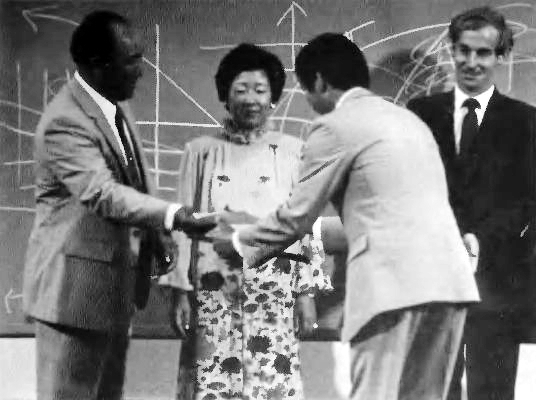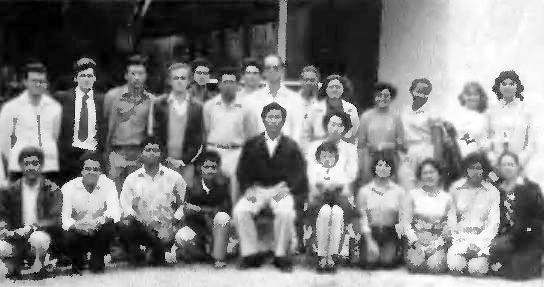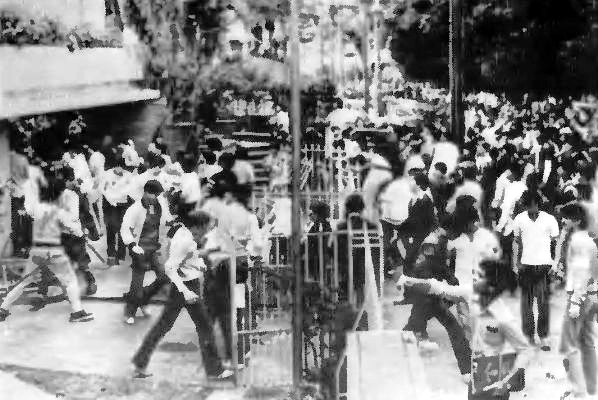![]()
The Words of the Kim Family Before 2008
|
|
The Words of the Kim Family Before 2008 |

Rev.
Kim receives the prize from True Parents at the World Mission Center
in New York, Children's Day, November 1983.
This article was written based upon a report from Leornes Pereira, cultural department director of the Unification Church in Brazil.
This is a brief history of the Unification Church in Brazil. It is also the story of Rev. Hyung Tae Kim and his accomplishments in that country.
In 1965, Father made his first global trip, and visited forty countries. While he was staying in Brazil, he personally founded the church in that country and assigned Mr. Tatsushiko Sasaki, a missionary from Japan, to be its leader. This was the very beginning of the Brazil church.
In 1973 the second missionary, Mr. Paul Perry, returned to Brazil, his native country, and worked in Rio de Janeiro. In 1975, three Japanese representatives of Happy World Company -- Tom Nishiwak, Goji Oseki, and Tomoichi Sogo -- were sent to Sao Paulo, Brazil, to establish the economic foundation.
On August 23, 1975, Rev. Hyung Tae Kim arrived in Brazil. In the beginning he worked as a gardener and then at a Korean fabric company. In September of the same year, the Little Angels came from Korea. Rev. Kim met the three Japanese Happy World members and started to work with them.
Mr. Goji Oseki recalled those days: "We six people lived together in a basement with two beds. Three people shared one bed. We laid our heads and backs on the bed, dropped our legs on the floor and slept. The room was deep and cold, and the window was level with the street. When it rained, water used to flow into the basement bedroom."
After this difficult life Rev. Kim rented a house at 1099 Luis Gois Street, Vila Mariana, Sao Paulo, and moved there. This was the first church building in Brazil. There they formally registered as HSA-UWC with the Brazilian government. Here the first three Sao Paulo church members joined: Mr. Mauricio Raimundo Baudini, Ms. Fatima Cardoso Silveira, and Ms. Maria da Penha Alonso.
From this time on, Rev. Kim dispatched church leaders one after another to pioneer each region and thus expand the church throughout the country. As a result of this push, in December 1975, the first seven day workshop was held, In February 1976, the first 21 day workshop was held. Waldir Cipriani, one of the earliest church members in Brazil and presently the church president, has given the following testimony about Rev. Kim's heart and lifestyle during the early days of the church in Brazil:
As long as we believe in Reverend Moon as a man chosen by God to do His will, his words must be truth and must spread throughout the whole, world. Therefore his words and deeds couldn't contradict each other. Considering also that God blessed
Rev. Kim to do successful pioneering work in Brazil, I believe that he has kept to Divine Principle and lived along with it.
I remember Rev. Kim mostly tried to teach us about a life of prayer and deep understanding of Heavenly Father's and True Parents' heart.
We gradually realized the meaning of Rev. Kim's teaching through a sacrificial and dedicated lifestyle, and his practical teachings gave us a lot of inspiration and spiritual power to overcome every difficulty. Without a deep and solid foundation one can't build a tall building. By the same token, if we had not used the Divine Principle in our daily lives, it would have been impossible to overcome the many difficulties of the early church in Brazil.
I know that Rev. Kim never changed the basic educational system which he originally learned from Father directly. Some members complained that his method was not from Father but from Korea. However, Rev. Kim never changed his attitude, and the real result began to come as time passed.
Now everybody believes that the Brazil church could develop and grow because Rev. and Mrs. Kim laid a good foundation through their tears and sweat. Rev. Kim always taught that in order to unify this world, we must keep Heavenly Father's heart and tradition. Following his teaching, we educated new members through suffering and deep understanding of Divine Principle. Beyond any doubt Rev. Kim was a wonderful example for bringing us the heavenly words and tradition.
Rev. Kim joined the church in 1959. His younger brother joined the Unification Church first and three years later, Rev. Hyung Tae Kim finished his three years of required military service and joined himself.
In 1966, at the age of 25, Rev. Kim became financial director of the Kangwon region in Korea. During those days he began to understand God's heart and Father's great vision for the future. Thereafter he served as a regional church director for one year, and as an IFVOC general director for two years. Then he received an inspiration to become a foreign missionary. He started a one hundred day morning prayer condition at the holy ground. After he finished the one hundred days, he felt it was not enough, so he began a one thousand day prayer condition. For one thousand days at five o'clock in the morning he climbed to the holy ground, even in rain or snow. When he finished the prayer condition, he decided to go to South America.
At that time the Korean government had a very tight emigration policy. Furthermore he had no money for his plan. In this moment Rev. Kim demonstrated great faith. In Korea most families have their own special land or mountain to worship their ancestors. Usually they bury their dead in this special territory. According to strong family traditions, people think of that special land as a sacred territory and care for it as they would their own lives. Rev. Kim was the first son, and had the right to sell the land. He sold it, donated half of the money to the church, and used the other half for his trip to Brazil. Because of this crazy deed, all of his relatives and neighbors thought of him as a betrayer of the Kim clan, and some even tried to kill him.
Amid this turbulence Rev. Kim left Korea for Brazil on August 23, 1975.
Rev. Kim has rarely shared his personal testimony, but he did speak of his pioneering experience in Brazil in October 1983:
When I arrived in Brazil, my first concern was how to teach these people God's tradition, God's heart, and His love for them. I tried to demonstrate to members my personal experience of Father's teachings through my daily practice and action.
I always set up very clear weekly and monthly goals, and I strove to accomplish them. I had such giant plans that members sometimes couldn't understand and they would come out against them. This troubled me greatly. But, nevertheless, I tried to love the members more than my own family.
I was never discouraged by opposition from members or their complaints of too much work. My spirit grew stronger and I prayed to God to please use me for His work here in Brazil.
I was also concerned about educating members about the importance of using public assets for the public purpose and the restoration of materials. I always tried to have three people who could testify that / was using church assets for the public purpose. Through my experience I realized that every project could only be successful when there are three people supporting it. It's a very principled point of view.
I always emphasized that we must obey and work to accomplish the given goal or plan with faith, even though it is difficult to understand.
When I saw members making mistakes, I tried to forgive them and examine myself instead of accusing them. I believed if we had a strong internal foundation, external results would come along automatically.
I thought that if I were a better person, a more capable man, I could accomplish God's will much faster. So I prayed that God would bless us and guide to us a prepared person who would be able to do this job. Nowadays I pray for unity within the Brazil church. When we become perfectly one in harmony. God will give us a great leader who can restore this nation of Brazil.
What I pursue is not my own plan. It is God's idea; it is God who wants to restore the whole world. As Father fulfilled on the worldwide level, I just try to fulfill on the national level in Brazil.

Last
group of missionaries sent to other Brazilian cities by Rev. Kim in
1983.
In 1976 Rev. Kim assigned Mr. Paul Perry to translate the Divine Principle into Portuguese. He began on August 15, 1976, and the translation was finished by the next year on May 5. Its publication marked a great turning point for missionary activities in Brazil.
On July 10, 1976, two members were sent on a pioneering mission for the first time. Ever since, pioneering work has been expanded: on September 25, 1977, to three cities; on April 30, 1978, to seven cities; in December 1979 to 21 cities. Through these efforts more than 120 churches in all the major cities throughout the country have been established to date.
As mentioned earlier, Divine Principle workshops were first held in Brazil in 1975. By December 1983, eighteen 21 day workshops had been held. The first 40 day workshop was on July 10, 1980, and the fifth 40 day workshop was held in 1983, with 22 participants. Currently, weekend workshops and special workshops are also held occasionally. The nationwide video centers are very active and successful in witnessing. Cozy and comfortable video centers will soon be opened in every church center.
In 1979 the first Brazilian IOWC was organized. On March 20, led by Mr. Mauricio Raimundo Baudini, its members left Sao Paulo by minibus for a 21 city witnessing campaign. At present, the national IOWC uses four large buses all year round. Each team moves every month from city to city, conducting seven day workshops. All IOWC teams are basically self- supporting, provide educational experiences for members and bring good witnessing results.
After Father introduced the home church providence, Rev. Kim began to speak about home church. However, in practical terms, home church began in the Brazil church in 1982 with volunteer activities, such as street cleaning, helping neighbors, etc. Members began home church by selling eggs door to door. While selling eggs, they made good friends and tried to help people in other ways whenever they could. Soon many people in the neighborhoods came to like the kind and sincere egg-sellers. Some members were given nicknames related to eggs. A support system for home church followed. For example, guests were invited to a simple dinner or to an introductory seminar in our video center, and then to attend our regular seven day workshop. Literature to support home church was published as well.
In 1980, the International Association of Freedom and Peace, which is in charge of the student movement in Brazil, and an IFVOC chapter were founded. They now publish a monthly paper, and have produced a book discussing our critique and counter-proposal to communism which was distributed throughout the country, especially to students.
Church activities were always accompanied by VOC activities. In 1981, in cooperation with CAUSA, the CAUSA International Conference was held in Rio de Janeiro with three hundred participants.
The first book published by the Brazil church was the Divine Principle. Thereafter small introductory pamphlets and many other types of literature were produced.
In 1980 the Brazil church started a publishing company, the Il Rung Publishing Co., which recently published a second edition of the Divine Principle. This company also publishes the monthly Unified World, and World Family.
In addition, the cultural department published Light of Love, a book of Rev. Kim's sermons, Perseverance, by Rev. Waldir Cipriani, and a monthly paper, University Tribune.
In the beginning, Rev. Kim himself worked at a job to support the church financially. When his wife came to Brazil, they opened a fabric company and worked from 5:00 a.m. to midnight to lay an economic foundation for the church.
Thanks to successful witnessing campaigns, church membership increased, and fundraising began with well-known products-candy and flowers. With the help of contributions and donations, the church opened a pharmacy and a picture sales company. Thus, eventually, a solid economic foundation was made.
In addition, the following companies have been founded in Brazil: Brazil II Hwa Trade Co., Tong II Custom Tailor Co., II Heung Food Trade Co., World Jewelry Trade Co.
The Brazilian church has an annual three day festival for parents of church members in Sao Paulo. This is an excellent opportunity for members to invite their parents to the church, report to them about church activities and offer them an introductory seminar on Divine Principle.
Brazil has a national children's festival on October 12. The church also celebrates an annual Children's Day on that day, inviting children and their parents. Last year three thousand people attended the church-sponsored celebration.
The Brazilian church is highly involved in the international activities of the Unification Church. It assists and supports the Professors World Peace Academy, the International Cultural Foundation, IRFF, and New ERA. Each year the Brazilian church sponsors Brazilian guests to ICUS and the World Media Conference.

The
great persecution in 1981. Attack on the church center.
In 1981, shortly after the CAUSA seminar on Victory Over Communism, communist groups in Brazil began an anti-Unification Church campaign through the mass media, and tried to spread evil rumors about the church.
In August, the communist groups mobilized their young members and attacked our churches, destroying several church facilities in acts of outright communist terrorism.
At that time, Rev. Kim was in the United States. With the help of one member, his one-year-old daughter narrowly escaped from the terrorists through the roof of a church building. The government ordered Rev. Kim arrested and began an investigation of our church, based on the rumors. The false charges wouldn't bear examination, and officials soon realized that this was typical of religious persecution by leftist groups. They discovered that the Unification Church was a sincere, sound religion.
Our churches, the fruits of our faith and result of our tears, sweat and blood, were destroyed. Yet, through our members' dedicated efforts, the Brazilian churches were completely restored within three months. The ordeal turned out to be a great blessing. In 1982, Rev. Kim was honored with a decoration from the Giuseppe Garibaldi Legion of Honor, a Brazilian society. This decoration is usually given to a foreigner who has greatly contributed to Brazil's culture, social wellbeing, or religious education.
After this ordeal the church in Brazil had not lost any members; actually, more members joined. Now it has more than one thousand full-time members and more than ten thousand associate members.
In 1982, Rev. Kim, acting with the heart of a true parent, sent members to the Blessing, despite great financial difficulties. One hundred forty-three members received the Blessing. They constitute the foundation of the Brazilian church.
Father sent out missionaries to 120 countries in 1975. Seven years later, in 1982, he gave prizes to four countries for successful missionary work. The Brazilian church was recognized by True Parents as the most successful mission country of all. Being honored in this way was truly a testimony to the work of Rev. Kim and to the efforts of all the church members in Brazil.